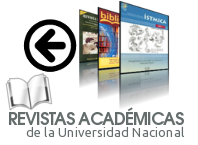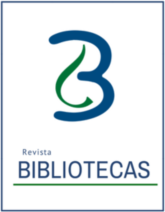Use the OPAC: education service users for use of automated catalogs
Keywords:
Information services, User education service, Design of information services, Online catalogs, Use the OPACAbstract
Service design and information products must be based on the information needs of users. Education services for users seeking to build skills in users for their efforts before the search, retrieval and use of information. The research presented classified as applied, it provides solutions to problems identified in practice. To obtain results methods are combined in the theoretical and empirical level, as well as techniques that facilitate the collection of information. Is designed an education service users for the use of automated catalogs, resulting in the design of a tutorial for users of the Centre for Scientific and Technical Information Documentation of the Universidad Central “Marta Abreu” de Las Villas. For service design takes into account aspects such as the context, users and human, political and financial limitations
References
Alfaro, J. (2005). Servicios de información. Costa Rica. Disponible en: http://www.Deluxe-Menu.com
Belimpasakis, P. y Saaranen, A. (2010). “Sharing with people: a system for user-centric content sharing”. In Multimedia Systems, 16(6), 399-421.
Cabrera, F.A., Donoso, T., Aneas, A. y Del Campo, J. (2010). “Valoración de la satisfacción de usuarios de programas sociales: propuesta de un modelo de análisis”. En Revista de Educación, 351(2010), 311-336.
Cañedo, R. (2006). “Algunas aproximaciones teóricas a los servicios de alto valor agregado, diseñados a la medida y orientados al conocimiento”. En Acimed, 14(2006), 1-6.
Figueredo, A.L., Figueredo, M.C. y Aponte, C. (2013). “La biblioteca universitaria como institución de apoyo a la docencia y la investigación”. En Revista Bibliotecas. Anales de investigación, 31(1), 1-8.
Gallo, J.P. (2008). “Innovación en los servicios de bibliotecas públicas orientadas al usuario. El caso de la Biblioteca Regional de Murcia”. En El profesional de la información, 27(2), 144-154.
García, F.J. (2004). “La formación de usuarios en la biblioteca pública virtual. Recursos y procedimientos en las bibliotecas públicas españolas”. En Anales de Documentación, 7(2004), 97-122.
González, A. (2011). “La perspectiva del usuario y del sistema en la investigación sobre el comportamiento informacional. Teoría de la Educación”. En Educación y Cultura en la Sociedad de la Información, 12(1), 9‐27.
Harsh, A. y Mishra, J.K. (2012). “Oh! Web 2.0, Virtual Reference Service 2.0, Tools & Techniques (II)”. In Journal of Library & Information Services in Distance Learning, 6(1), 149-171.
Lancaster, F.W. (1980). Pautas para la Evaluación de Sistemas y Servicios de Información. París: UNESCO.
Paz, L.E. y Manso, R.A. (2014). “Usuarios, servicios de diseminación y tecnologías sociales: una convergencia necesaria”. En INFOACCESO, 1(2), 2-3.
Paz, L.E., Hernández, E.A. y Manso, R.A. (2014). “Diseño de la Arquitectura de Información para el Producto: InfoFEU-UCLV”. En Revista Infociencia 1(19), No.1, 1-12.
Rendón, M.A. y Hernández, P. (2010). “Sense–making: ¿metateoría, metodología o heurística?”. En Revista Investigación Bibliotecológica, 24(52), 61-81.
Setién, E. (1993). Servicios de Información. Ciudad de la Habana:Editorial Pueblo y Educación.
Wang, X. y Klinc, R. (2012). “Special issue: eLearning 2.0: Web 2.0-based social learning in built environment”. In Journal of Information Technology in Construction, 17(2012), 386-387.
Downloads
Published
How to Cite
Issue
Section
License
Bibliotecas provide immediate open access to their content, based on the principle of facilitating research to the public free of charge and free of charge to promote the global exchange of knowledge.
The journal Bibliotecas is a publication hosted by a public higher education institution, which is supported by public resources. Since its inception, the magazine has offered all its contents free of charge without any restriction on the rights of: reading, downloading and printing in full text. Works published in libraries may be analyzed, quoted and reproduced in whole or in part, mentioning the original source.
The journal Bibliotecas is licensed under the Creative Commons Attribution - Non-Commercial - Share Equal, 4.0 International license; therefore, it is allowed to: share, copy and redistribute the material in any medium or format.

Este obra está bajo una licencia Creative Commons Atribución-NoComercial-CompartirIgual 4.0 Internacional.








